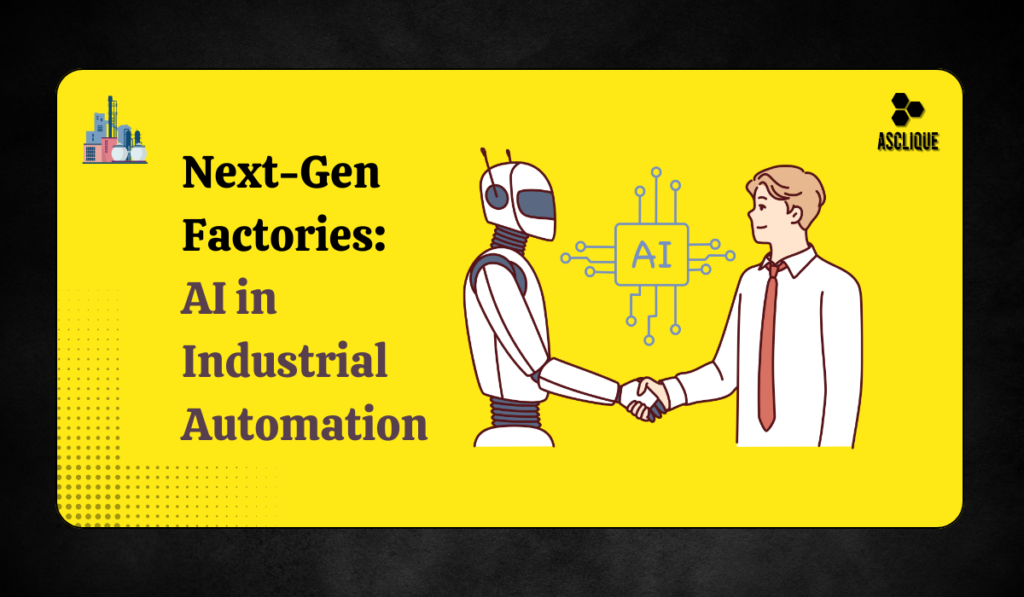Artificial Intelligence (AI) is revolutionizing every sector it touches—and AI in industrial automation is no exception. From intelligent robots on the shop floor to AI-powered analytics driving predictive maintenance, manufacturers are embracing digital transformation like never before.
In this post, we will look at how AI in industrial automation is improving manufacturing processes, delivering tangible benefits in the real-world, and helping shape the future of smart factories.
Understanding Industrial Automation in the AI Era
Historically, the process of industrial automation was largely based on purely mechanical methods and basic programmable logic. The emergence of AI in industrial automation gives machines the ability to learn from data, adapt to changing conditions, and optimize their operation with limited human involvement.
In the future, the all encompassing flexibility of rigid automation is progressively being replaced with intelligent and disruptive systems that engage in real-time decision making—raising the true potential of AI in industrial automation.
Key Ways AI is Enhancing Industrial Automation
Predictive Maintenance
AI consumes streams of sensor data and predicts equipment failures before they occur. This minimizes unplanned downtime, cuts maintenance costs, and increases machine uptime.
Intelligent Quality Control
Computer vision and machine learning algorithms can identify even the smallest fades in product quality that go unnoticed by human eyes. That translates into assured quality, more product waste, and happy customers.
Process Optimization
By analyzing operational data, AI can help streamline production processes. By continuously learning from inputs and outcomes, AI can reduce energy consumption, material waste, and cycle times.
Enhanced Robotics
The increasing power behind artificial intelligence allows robots to undertake complicated, non-repetitive tasks. Cobots collaborate with human operators to enhance productivity without jeopardizing safety.
AI Real-World Application in Industry
Smart Factories
AI allows factories to self-monitor and analyze their operations for any desired improvements. Organisations such as Siemens and Bosch put AI into practise to maintain near-perfect quality rates and operational efficiency.
Inventory and Supply Chain Optimization
AI is able to forecast demand, automate restocking procedures, and improve logistic decisions, making just-in-time production more feasible and responsive to market fluctuations.
Worker Safety and Regulatory Compliance
AI detects unsafe behaviours, monitors environmental conditions, and manages compliance reporting, thereby assisting manufacturers in conforming to stringent regulatory standards.
Advantages of Industrial Automation with AI
- Efficiency in Operations: Optimized processes and minimized cycle times.
- Cost Benefits: Minimized maintenance and power expenses, minimized waste.
- Enhanced Product Quality: Uniform, data-based quality checks.
- Enhanced Safety: Less human error and unsafe accidents.
- Scalability: Improved ability to adjust with changes in product design or quantity.
- Sustainability: Better use of resources and minimized carbon footprint.
Industry-Specific Applications
Automotive
- AI-driven robotics-based flexible assembly lines can produce several models with little loss of time.
Pharmaceuticals
- AI provides rigid adherence to production standards while accelerating the production of customized drugs.
Food and Beverage
- AI improves uniformity, tracks cleanliness, and automates sorting, packaging, and quality inspection.
Challenges to Consider
- Implementation Expense: AI infrastructure and training need substantial initial capital expenditure.
- Skill Deficiency: There is increased demand for experts in AI, data science, and industrial automation.
- Data Protection: Greater connectivity exposes users to new risks that necessitate robust cybersecurity practices.
- Legacy System Integration: Retrofitting or replacing aged equipment may be necessary to accommodate contemporary AI technology.
AI and the Rise of Smart Factories
AI in factory automation gives intelligent factories the power to connect machines, systems, and humans along the value chain. The factories can detect faults on their own, optimize processes, and rapidly adapt to design changes—a far cry from traditional manufacturing norms.
The Role of Data in AI-Driven Automation
Data constitutes the foundation of AI within industrial automation. Sensors, IoT devices, and connected machines generate massive amounts of data that AI systems use to learn, forecast, and optimize processes. Efficient data collection, storage, and management are important for AI to offer credible insights and promote effective automation results.
The Future: What’s Next for AI in Industry?
The integration of AI with IoT, 5G, and edge computing is creating smarter, more agile factories. Key trends include:
- Hyperautomation: Combining AI with robotic process automation for end-to-end optimization.
- Edge AI: Preprocessing data on devices to enable quicker, local decision-making.
- Self-Healing Systems: Devices that automatically detect and repair their own faults.
- AI-Driven Customization: Real-time modifications to suit unique individual customer requirements without interrupting production.
Also Read: How AI is Shaping the Future of Content Marketing
Conclusion
AI is revolutionizing the landscape of industrial automation, shifting the focus from rule-based, conventional mechanisms to adaptive, smart processes. With real-time decision-making now within reach, predictive analytics, and increased efficiency in operations, AI is empowering manufacturers to deal with the stresses of a dynamic, data-driven world.
While challenges such as the expense of deployment and employees’ readiness remain, the long-term benefits—ranging from enhanced productivity to improved safety and sustainability—make AI a core component of industrial policy nowadays. As industries continue to evolve, embracing AI will play a crucial role in building more robust, flexible, and competitive operations.
The manufacturing future is not only automated, but it’s intelligent.
FAQ’s
What is AI in industrial automation?
AI enables machines to process information, learn from it, and take smart decisions. It gives intelligence to industrial automation systems.
How does AI improve manufacturing operations?
AI improves productivity through real-time optimization, predictive maintenance, and automatic quality inspection. It reduces downtime and waste.
Is AI for large manufacturers only?
No, AI solutions are scalable and inexpensive today, and therefore accessible to small and medium-sized manufacturers.
What’s the distinction between AI and traditional automation?
Old-fashioned automation is based on rules, whereas AI is able to learn and adapt to novel conditions through data.
What are the main challenges to applying AI in industry?
High upfront costs, legacy system integration, and finding skilled resources are key challenges.

